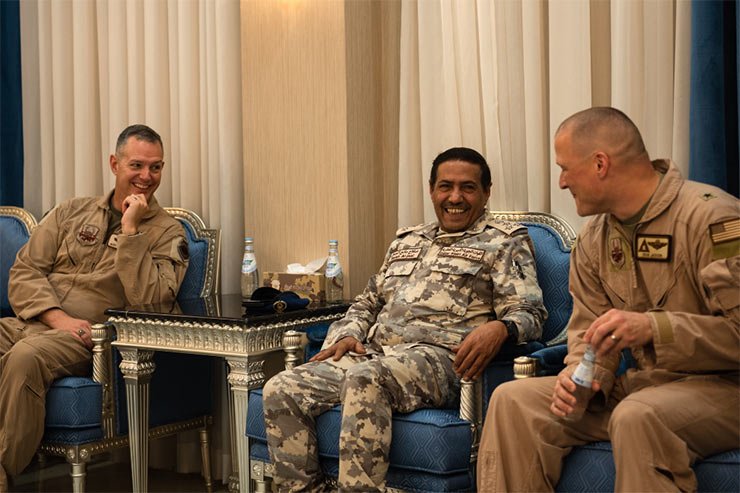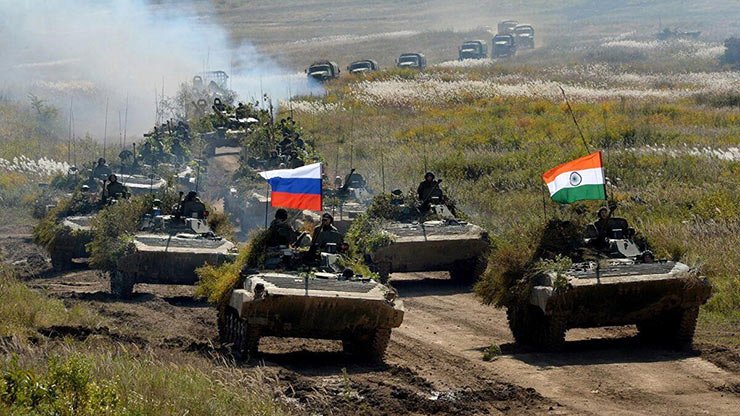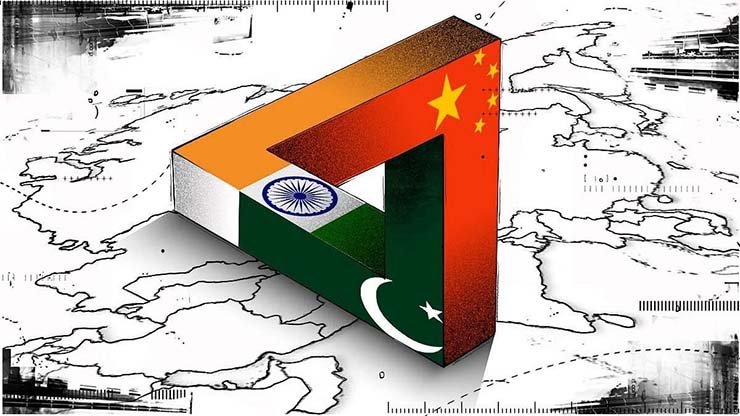Subtle Dynamics: Military diplomacy has been a rather new phenomenon of reaching out to friends and partners through visits of senior military commanders, joint military exercises, joint training, port calls and at times offering high-end defence technologies. It primarily came onto the horizon post World War II when the need was felt to continue close engagement of forces with allies and friends. It is the presence of subtle dynamics of raw power, which militaries represent, that makes the diplomatic end state of a nation’s will to be achieved. It also reflects a nation’s confidence in its military to undertake this demanding responsibility independently.
Military diplomacy is not independent but only complements diplomatic outreach in a multifarious way. It essentially underlines the role of the military beyond the convention of attack and defence. Many times, the terms Military diplomacy and Defence diplomacy have been used interchangeably. Though they carry similar tones they both have a subtle difference, as the latter necessitates the involvement of civilian components. Military diplomacy thus remains an exclusive forte of the military’s leadership and its integral resources.

Policy Facilitation
There are multiple instances to suggest the extensive use of this instrument by global powers like the US, Russia and NATO where all of them have very strong militaries. Note the case with Russia which conveniently sells arms and conducts military exercises with both India and Pakistan, who are clearly at odds with each other. NATO a purely security alliance has expanded its presence towards Africa and Asia, beyond its organic charter of Europe, through Individual Cooperation Programmes and multiple joint military forays with host nations.
The most visible orchestration of military diplomacy has been by the world’s leading power the US, which engages its allies and partners through multiple domains many being conventional diplomatic means and many through military-level engagements. The US executes military diplomacy to manage its global military deployments and more than 750 overseas bases. It has proved to be one of the finest means for navigating through the challenges of dealing with military juntas and pseudo-democracies like Pakistan. Incidentally, it provides a better window of ‘policy facilitation’ for conventional diplomatic needs, such an approach has given rich dividends to the US.
India’s approach to military diplomacy thus far has been restricted to holding joint exercises, military interactions, port calls and some guarded defence deals. This is surprising, especially keeping its military power projection capabilities in mind. India’s military interactions with countries of importance have been routed through its Defence Attaches’ who remain heavily dependent upon embassy resources. The approach though is valuable but its effectiveness remains limited

Fresh Perspective
India’s approach to military diplomacy thus far has been restricted to holding joint exercises, military interactions, port calls and some guarded defence deals. This is surprising, especially keeping its military power projection capabilities in mind. India’s military interactions with countries of importance have been routed through its Defence Attaches’ who remain heavily dependent upon embassy resources. The approach though is valuable but its effectiveness remains limited.
Currently biggest concerns nations have to deal with, pertain to national security and economic development. India’s neighbouring security environment remains fragile at best, it calls for augmenting efforts to find newer means to address such daunting challenges. It is worth a realisation today, that neither diplomacy nor the military means would sufficiently be able to secure national interest and execute national will. India would likely need a fresh perspective on the evolving challenges. Maybe a few decades back, employing the military to ensure only territorial integrity was fine, but current circumstances are much tougher. Further employment of national military resources to back national priorities would eventually prove highly rewarding.

Strong Prerequisites
In the case of India, not only do strong prerequisites for Military diplomacy exist but also there’s a critical need to take such a purposeful recourse. As per the Global Firepower Index, India is the world’s fourth strongest military power, with the fifth largest economy, it is the seventh-largest country by land mass and the largest nation by population. It’s undoubtedly an envious mix. India has a very hostile neighbourhood together with an epic global competitor. A conventional textbook-like suave diplomatic approach doesn’t necessarily work in such circumstances. The principles of reasoning, persuasiveness and accommodative approach, which otherwise are the hallmarks of diplomacy don’t get appreciated. On the contrary, they are taken as signs of weakness. These pressing circumstances are all the more reasons why India needs a new look at military diplomacy.
Let’s take the case of Pakistan for instance, its persistence with terror has resulted in India rightfully downgrading diplomatic interactions to the barest essentials. But many argue a complete breakdown of communication with even the worst of the adversaries is also not in the larger interest. Owing to the dynamics involved, routine diplomatic contact with unavoidable protocols makes it almost impossible to proceed. The kind of frantic media attention an India-Pakistan engagement draws leads to unwarranted scrutiny and equally wild speculations, making it impractical to adopt an accommodative approach for either one. Results therefore become predictable, a wasteful exercise of no consequence.
It is such peculiar challenges that military diplomacy becomes a highly significant tool for the nation. Military diplomacy essentially allows engagement with uniformed leadership of the subject nation. Advantages are numerous but to highlight a few significant ones are – it has minimal visibility and attains a relatively lower profile vis a vis regular diplomatic outreach; it remains relatively immune to political slugfest, it holds higher sanctity than Track II initiatives while remaining below the radar as compared to a regular interaction.
India has a very hostile neighbourhood together with an epic global competitor. A conventional textbook-like suave diplomatic approach doesn’t necessarily work in such circumstances. The principles of reasoning, persuasiveness and accommodative approach, which otherwise are the hallmarks of diplomacy don’t get appreciated. On the contrary, they are taken as signs of weakness. These pressing circumstances are all the more reasons why India needs a new look at military diplomacy
Specific takeaways of military diplomacy in the case of India’s neighbourhood scenario are going to be worth a treasure. For Pakistan all political interaction becomes the hostage of GHQ approvals, creating a complete loss of confidence in the entire effort. India’s sensitivity to upholding its democratic values mostly prevents direct engagement with any Military leadership even if there’s a namesake civilian government in the office. Such scenarios are apt for taking recourse to military diplomacy and gaining direct interaction with actual power centres. A dialogue between uniformed people generally holds greater transparency as they are very well aware of the ‘actual’ ground situation. They also can quickly call out bluffs and digressions.
Also as a norm, the military leadership is mostly not very keen on media interactions unless they strictly relate to operational matters of larger interest to the nation. In a democratic setup like India, the government will get a ‘full and clear’ brief of steps needed for certain desired outcomes. This will qualitatively aid the collective decision-making process on matters of key national interest. Interestingly on the other side, the entire country including all organs of the state is habitual of settling with dictates from Rawalpindi.
Beyond diplomatic returns, it will also offer India an important line of communication that prevents any perception ambiguity and de-risks accidental escalations. Communication is worthwhile only when there’s an ‘understanding of the intent’ and military diplomacy would accrue exactly that. For instances like China, Pakistan, or any other covert or overt authoritarian regimes, prioritising their engagements through military diplomacy would offer a disproportionate advantage to the nation. This will make India’s fresh approach to military diplomacy an unavoidable treasured resource!
–The writer has varied experience in security paradigm and is a keen follower of international geopolitics. He is also the author of popular blog site (geostrat.in) on geo-strategic affairs. The views expressed are personal and do not necessarily reflect the views of Raksha Anirveda
-The writer has varied experience in the security paradigm and is a keen follower of global geopolitics. His work has been regularly featured in national publications. Visit newsanalytics.in to access more articles from the author. The views expressed are of the writer and do not necessarily reflect the views of Raksha Anirveda





